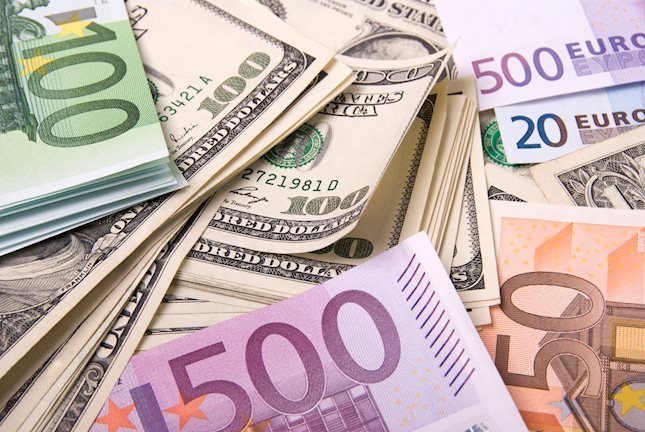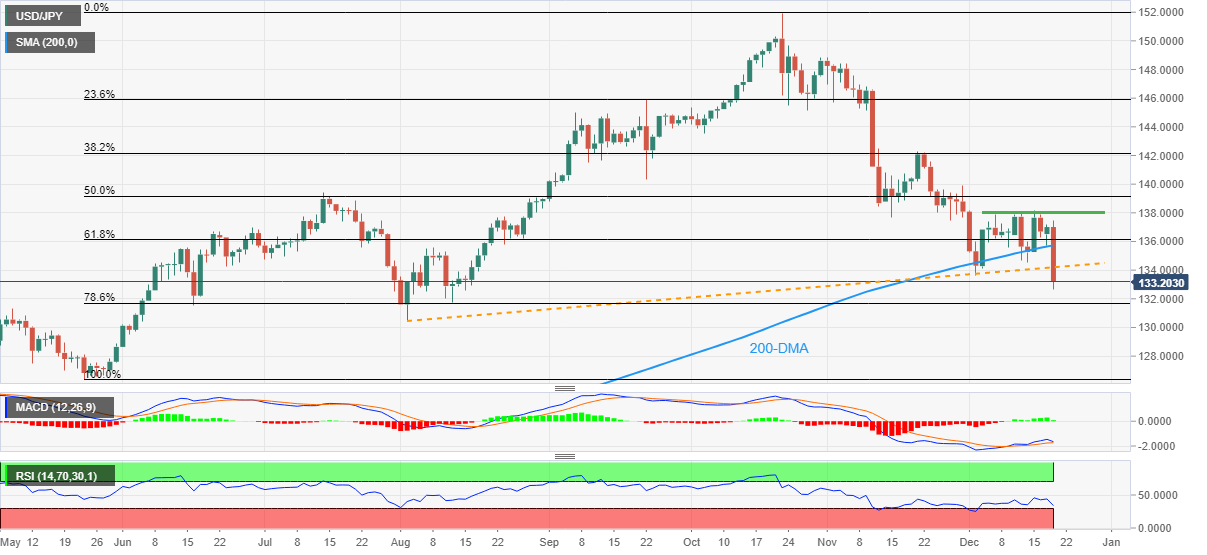- USD/JPY drops more than 3.0% to refresh multi-day bottom after Bank of Japan tweaks Yield Curve Control (YCC) policy.
- Chatters surrounding Japan’s budget, Treasury bond buying also entertain Yen traders.
- BOJ Governor Kuroda shows readiness to ease policy if needed, USD/JPY stays pressured.
- Risk aversion fails to underpin US Dollar as Federal Reserve appears less hawkish.
USD/JPY bears the burden of the Bank of Japan’s (BOJ) surprise policy tweak during early Tuesday, despite the latest rebound. While portraying the Yen trader’s mood, the quote initially slumped to the lowest levels since early August before the recent bounce from 132.66 to 133.60. Even so, the quote remains 2.75% in the red as we write.
Bank of Japan surprises markets with YCC move, drowns USD/JPY
Bank of Japan (BOJ) held its benchmark rate unchanged at -0.10% and kept the short-term interest rate target at -0.1% while directing 10-year Japanese Government Bond (JGB) yields toward zero. In doing so, the Japanese central bank matched the market expectations and should have kept the USD/JPY intact.
The surprise factor, however, was the BOJ’s alteration of the Yield Curve Control (YCC) and the bond issuance announcements. “The BOJ will expand the range of 10-year Japan government bond yield fluctuations from its current plus and minus 0.25 percentage points to plus and minus 0.5 percentage points,” reported Reuters. Following that, the Yen pair plunged to the multi-day low of 132.66 ahead of bouncing back beyond 133.00.
The BOJ not only affected the USD/JPY prices but also roiled the risk appetite and propelled the Treasury bond yields across the board, which in turn allowed the US Dollar to pare intraday losses.
BOJ Governor Haruhiko Kuroda defends Yen buyers
Having witnessed the BOJ-inflicted slump in the USD/JPY prices, Governor Haruhiko Kuroda allowed the Yen traders to lick their wounds while defending the easy money policies for one last time.
In doing so, BOJ’s Kuroda highlights the need for a 2.0% inflation target, as well as shows readiness to ease monetary policy if needed.
“Today's decision on yield curve control is not an exit of yield curve control or change in policy,” said BOJ’s Kuroda per Reuters.
US Dollar fails to cheer risk-off mood
Despite the risk-aversion wave, the US Dollar Index (DXY) remains mildly offered near 104.40, down for the second consecutive day. The reason for the USD/JPY pair’s weakness could be linked to the Federal Reserve’s (Fed) less hawkish bias, as informed via the latest monetary policy meetings, as well as the softer US Purchasing Managers’ Indexes (PMIs) for December. Also likely to have weighed on the US Dollar are the strongly hawkish statements from the European Central Bank (ECB) officials, as well as upbeat German data.
Risk catalysts will be crucial for Yen sellers
Looking forward, USD/JPY pair bears need to pay close attention to the risk catalysts and the bond market moves for near-term directions amid a light calendar. Also important will be the US Building Permits and Housing Starts could join Germany’s Producers Price Index (PPI) data to direct immediate moves. However, major attention will be given to the Fed’s preferred inflation gauge, namely Friday’s US Core Personal Consumption Expenditure (PCE) – Price Index for December, expected 4.6% YoY versus 5.0% prior.
USD/JPY technical analysis
USD/JPY extends a downside break of the 200-DMA, as well as an upward-sloping trend line from early August, towards refreshing the multi-day low.
Given the impending bear cross on the Moving Average Convergence and Divergence (MACD) indicator, as well as the downbeat Relative Strength Index (RSI), located at 14, not oversold, the USD/JPY pair is likely to extend the latest weakness.
However, the RSI (14) is near the oversold territory and hence signals limited downside room, which in turn highlights the 78.6% Fibonacci retracement level of the May-October upside, near 131.70.
Also acting as the downside filter is the August month low near 130.40 and the 130.00 round figure.
In a case where the USD/JPY rebounds from the current level, the support-turned-resistance line from August, around 134.15 by the press time, could challenge intraday bulls.
Following that, the 200-DMA hurdle surrounding 135.75 will be crucial to watch for the Yen buyers.
Above all, a two-week-old horizontal resistance area near 138.00 could restrict the USD/JPY buyers from entering the ring.
USD/JPY: Daily chart
Trend: Limited downside expected
Information on these pages contains forward-looking statements that involve risks and uncertainties. Markets and instruments profiled on this page are for informational purposes only and should not in any way come across as a recommendation to buy or sell in these assets. You should do your own thorough research before making any investment decisions. FXStreet does not in any way guarantee that this information is free from mistakes, errors, or material misstatements. It also does not guarantee that this information is of a timely nature. Investing in Open Markets involves a great deal of risk, including the loss of all or a portion of your investment, as well as emotional distress. All risks, losses and costs associated with investing, including total loss of principal, are your responsibility. The views and opinions expressed in this article are those of the authors and do not necessarily reflect the official policy or position of FXStreet nor its advertisers. The author will not be held responsible for information that is found at the end of links posted on this page.
If not otherwise explicitly mentioned in the body of the article, at the time of writing, the author has no position in any stock mentioned in this article and no business relationship with any company mentioned. The author has not received compensation for writing this article, other than from FXStreet.
FXStreet and the author do not provide personalized recommendations. The author makes no representations as to the accuracy, completeness, or suitability of this information. FXStreet and the author will not be liable for any errors, omissions or any losses, injuries or damages arising from this information and its display or use. Errors and omissions excepted.
The author and FXStreet are not registered investment advisors and nothing in this article is intended to be investment advice.
Recommended content
Editors’ Picks

EUR/USD clings to daily gains near 1.0300 after US PMI data
EUR/USD trades in positive territory at around 1.0300 on Friday. The pair breathes a sigh of relief as the US Dollar rally stalls, even as markets stay cautious amid geopolitical risks and Trump's tariff plans. US ISM PMI improved to 49.3 in December, beating expectations.

GBP/USD holds around 1.2400 as the mood improves
GBP/USD preserves its recovery momentum and trades around 1.2400 in the American session on Friday. A broad pullback in the US Dollar allows the pair to find some respite after losing over 1% on Thursday. A better mood limits US Dollar gains.

Gold retreats below $2,650 in quiet end to the week
Gold shed some ground on Friday after rising more than 1% on Thursday. The benchmark 10-year US Treasury bond yield trimmed pre-opening losses and stands at around 4.57%, undermining demand for the bright metal. Market players await next week's first-tier data.

Stellar bulls aim for double-digit rally ahead
Stellar extends its gains, trading above $0.45 on Friday after rallying more than 32% this week. On-chain data indicates further rally as XLM’s Open Interest and Total Value Locked rise. Additionally, the technical outlook suggests a rally continuation projection of further 40% gains.

Week ahead – US NFP to test the markets, Eurozone CPI data also in focus
King Dollar flexes its muscles ahead of Friday’s NFP. Eurozone flash CPI numbers awaited as euro bleeds. Canada’s jobs data to impact bets of a January BoC cut. Australia’s CPI and Japan’s wages also on tap.

Best Forex Brokers with Low Spreads
VERIFIED Low spreads are crucial for reducing trading costs. Explore top Forex brokers offering competitive spreads and high leverage. Compare options for EUR/USD, GBP/USD, USD/JPY, and Gold.
